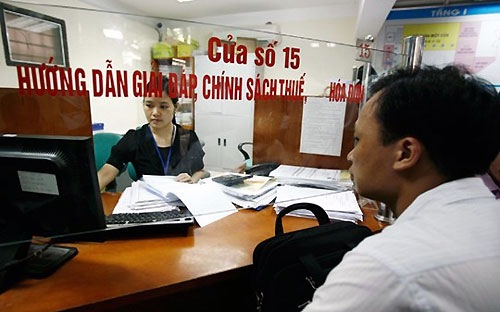According to Mr. Le Van Tang, Director General of the Public Procurement Agency under the Ministry of Planning and Investment, with the new points in the Law on Procurement 2013, it is expected to significantly improve state management of procurement activities in particular and contribute to enhancing the efficiency of state capital utilization in general in the coming time.

Mr. Le Van Tang stated that the Law on Bidding 2013 (effective from July 1, 2014), was developed based on objective requirements during the process of building and perfecting the legal system regarding procurement using state funds, thereby contributing to enhancing the effectiveness of State capital use.
In reality, the issuance of the Law on Bidding 2013 aims to create a common law, codify the content from other legal documents that govern bidding activities, overcome conflicts and overlap between legal documents within the same field, and ensure the uniformity and transparency of the legal system. Specifically, according to the analysis of the Bidding Management Department under the Ministry of Planning and Investment, the Law on Bidding 2013 has achieved 10 basic objectives as follows:
First, revise several existing regulations to simplify administrative procedures in bidding as per Resolution No. 25/ND-CP dated June 2, 2010, and Resolution No. 70/ND-CP dated December 27, 2010, of the Government of Vietnam. Concurrently, the Law provides more specific regulations on the procedures for selecting contractors and investors for each specific case.
Second, the Law has clarified the method of evaluating bid documents according to each specific field, such as choosing contractors (consulting services, non-consulting services, goods, construction, combined) and selecting investors. Additionally, the Law on Bidding 2013 also adds several new methods for evaluating bid documents to diversify evaluation methods and better align with each type and scale of the bidding package, while addressing the phenomenon of low-bid winning but lacking the capacity and experience to carry out the package.
Third, the Law on Bidding 2013 has focused on prioritizing human resource development, providing opportunities for local contractors to win bids and create employment for local labor, and offering incentives to local contractors and domestically-produced goods. This aims to implement the Politburo’s policy of "encouraging Vietnamese to prioritize the use of Vietnamese goods", while gradually helping Vietnamese contractors acquire advanced technology and management experience, become self-reliant, improve their capacity, and competitiveness to independently handle large, high-tech, complex projects not only in the Vietnamese market but also internationally.
Fourth, the Law has regulated the centralized procurement bidding method based on the summarized best international practices and pilot implementation results in Vietnam for widespread adoption in procurement activities. Under this method, instead of conducting procurement in hundreds of different agencies, a centralized procurement agency will be responsible for organizing professional procurement once. This method not only helps increase professionalism in procurement activities but also improves efficiency, shortens procurement time and costs, supports domestic production development, and encourages contractors to enhance the quality of goods and services.
Fifth, the Law has added a price negotiation form for drug procurement packages with only one to two manufacturers, proprietary drugs, rare drugs, drugs within the patent period, and other special cases as per regulations of the Government of Vietnam. “Drugs and medical supplies are special types of goods directly affecting people's health and lives; therefore, based on feedback, discussions from National Assembly members, and opinions from related ministries and sectors, the Law on Bidding 2013 has a special section on procuring drugs and medical supplies using state funds, health insurance funds, revenue from medical services, and other legal revenues of public medical facilities,” said Mr. Tang.
Sixth, based on summarized international practices and experiences selecting private investors in and out of the country for infrastructure and public service projects in Vietnam in recent times, the Law on Bidding 2013 has added principle-based regulations on procedures and methods for selecting investors. This is regarded as one of the decisive implementation solutions for executing public-private partnership (PPP) investment projects; aiming to promote public investment restructuring, create a solid legal basis for attracting and selecting investors transparently and competitively; and build investor confidence in the investment environment in Vietnam.
Seventh, the Law on Bidding 2013 also revised some existing regulations on contract signing, implementation, and management to enhance the responsibility of contractors and project owners during contract execution, avoid applying unsuitable contract types to the package's nature, arbitrary adjustment of contract prices, forms, and execution time, resulting in wastage and reduced investment efficiency of projects. “Lump-sum contracts are the basic type of contract. When deciding on fixed unit price or adjustable unit price contracts, the person approving the contractor selection plan must ensure that this type of contract is more suitable than a lump-sum contract,” Mr. Tang analyzed.
Eighth, the Law has delegated authority more thoroughly in bidding. According to Mr. Le Van Tang, unlike the Law on Bidding 2005, the Law on Bidding 2013 has thoroughly decentralized the decision-making on the direct contracting form to Ministers, heads of ministerial-level agencies, agencies under the Government of Vietnam, and Chairpersons of Provincial People's Committees without requiring submission to the Prime Minister for review and decision. However, alongside decentralization, the Law on Bidding 2013 strictly regulates the accountability of authorized entities and project owners during contractor and investor selection to avoid closed bidding processes.
Ninth is that the Law on Bidding 2013 is considered to have made significant progress in enhancing oversight and addressing legal violations in bidding. Specifically, the Law has added regulations on community supervision requirements during contractor selection and contract execution, added accountability for authorized individuals and state management agencies in bidding, and clearly defined individual responsibility for each activity in the bidding process to provide a basis for stipulating penalties commensurate with each violation.
Finally, the Law on Bidding 2013 has also intensified the handling of legal violations in bidding. Specifically, it supplemented several prohibited acts in bidding and additional penalties for individuals assigned responsibility for penalizing but not complying with regulations. Additional penalties may include publicization of violating organizations and individuals in the Bidding Gazette, the National Bidding Network System, or other mass media, compelling adherence to legal provisions on bidding, or compensating for damages as prescribed.
Currently, ODA donors have agreed to commonly apply the bidding documents template for official development assistance projects prepared by the Ministry of Planning and Investment. The template is expected to be completed and issued by the end of this year. This is an important step in addressing significant procedural differences that have been a considerable barrier to ODA projects, stemming from donor assessments that our bidding laws are approaching international regulations in this field.
Source: tapchitaichinh.vn
 Article table of contents
Article table of contents





.Medium.png)
.Medium.png)
.Medium.png)
.Medium.png)
